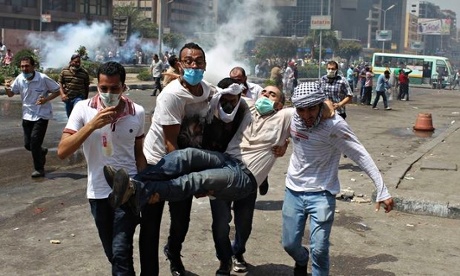The ‘security solution’
Azouli is one of the clearest examples of a resurgent security state that was never reformed under the successors to Hosni Mubarak (including the Muslim Brotherhood’s Mohamed Morsi, under whose presidency security officials were frequently accused of excessive force and torture) and in the past 12 months has exerted itself in almost unprecedented fashion.
Throughout last summer and early autumn, police and soldiers engaged in six mass killings of alleged Morsi supporters unmatched by any other in Egypt’s modern history. They began with the deaths of 51 Morsi supporters on 8 July 2013 and peaked with the clearance of a protest camp – Rabaa al-Adawiya– at which at least 637 died.

Post-Morsi governments have said the “security solution” is necessary to counter terrorism, a narrative made possible by a wave of jihadist-led bombings and ambushes in the Sinai peninsula – most notoriously, the assassination of 25 police conscripts in August. Islamist-led attacks on churches and police stations in the days after Rabaa also helped to justify it.
According to the interior ministry, at least 16,000 Egyptians have been arrested for political reasons since July 2013, though one independent estimate suggests the figure may be as high as 41,000.
As the interior minister, Mohamed Ibrahim, has admitted, many were arrested arbitrarily. “Every Friday, no less than 500 to 600 get arrested,” he said in January. “At the beginning, we used to wait for the demonstration to turn violent, but now we confront them once they congregate. When we confront them, there are some that run. But whoever we can grab, we detain.”
Most of the detainees are Morsi supporters. But the crackdown has widened to include anyone whose beliefs, actions or lifestyle threatens the state. Liberal academics have been banned from overseas travel, while those detained include allegedly gay men, at least 16 journalists and hundreds of secular activists, including figureheads of the 2011 uprising.
Read more